Dora Louise Murdoch | |
|---|---|
| Born | 1857 New Haven, Connecticut |
| Died | 1933 (aged 75–76) Baltimore, Maryland |
| Nationality | American |
| Known for | Painting |

Dora Louise Murdoch (1857-1933) was an American painter.
Dora Louise Murdoch | |
|---|---|
| Born | 1857 New Haven, Connecticut |
| Died | 1933 (aged 75–76) Baltimore, Maryland |
| Nationality | American |
| Known for | Painting |

Dora Louise Murdoch (1857-1933) was an American painter.
Murdoch was born on September 14, 1857, in New Haven, Connecticut. She studied in Paris, France where her teachers included, Bernard Boutet de Monvel, Gustave-Claude-Etienne Courtois, and Lucien Simon. [1]
She was a member of the American Federation of Arts, the American Watercolor Society, the Baltimore Watercolor Society, the New York Watercolor Society, and the Washington DC Watercolor Society. Her work was exhibited at the 1904 St. Louis World's Fair. [2]
Murdoch died in 1933 in Baltimore, Maryland. [2] Her work is in the collection of the National Gallery of Art. [3]

Georgia Totto O'Keeffe was an American modernist painter and draftswoman whose career spanned seven decades and whose work remained largely independent of major art movements. Called the "Mother of American modernism", O'Keeffe gained international recognition for her meticulous paintings of natural forms, particularly flowers and desert-inspired landscapes, which were often drawn from and related to places and environments in which she lived.
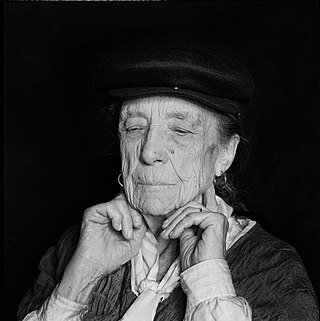
Louise Joséphine Bourgeois was a French-American artist. Although she is best known for her large-scale sculpture and installation art, Bourgeois was also a prolific painter and printmaker. She explored a variety of themes over the course of her long career including domesticity and the family, sexuality and the body, as well as death and the unconscious. These themes connect to events from her childhood which she considered to be a therapeutic process. Although Bourgeois exhibited with the abstract expressionists and her work has a lot in common with Surrealism and feminist art, she was not formally affiliated with a particular artistic movement.

Louise Nevelson was an American sculptor known for her monumental, monochromatic, wooden wall pieces and outdoor sculptures. Born in the Poltava Governorate of the Russian Empire, she emigrated with her family to the United States in the early 20th century. Nevelson learned English at school, as she spoke Yiddish at home.
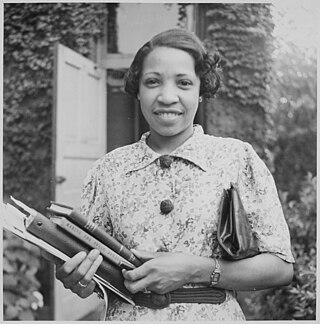
Lois Mailou Jones (1905–1998) was an artist and educator. Her work can be found in the collections of the Smithsonian American Art Museum, The Metropolitan Museum of Art, the National Museum of Women in the Arts, the Brooklyn Museum, the Museum of Fine Arts, Boston, Muscarelle Museum of Art, and The Phillips Collection. She is often associated with the Harlem Renaissance.

Jane Peterson (1876–1965) was an American Impressionist and Expressionist painter. Her works use broad swaths of vibrant colors to combine an interest in light and in the depiction of spontaneous moments. She painted still lives, beach scenes along the Massachusetts coast, and scenes from her extensive travels. Her works are housed in museums such as the Metropolitan Museum of Art, the Museum of the City of New York, the National Museum of Women in the Arts and the Hirshhorn Museum in Washington D.C., and the Pennsylvania Academy of the Fine Arts and the Philadelphia Museum of Art in Philadelphia, Pennsylvania. She was a fellow of the National Academy of Design and taught at the Art Students League from 1913 to 1919. During her lifetime, Peterson was featured in more than 80 one-woman exhibitions.

Dora Gordine was an Estonian Jewish Modernist figurative and portraitist sculptor. Her early career was influenced by the Noor Eesti group of artists who favoured Art Nouveau. She moved to Paris and on her third marriage, to Hon. Richard Hare (1907–66), her career expanded to the extent that some critics regarded her as amongst the finest sculptors of her generation. She specialized in portrait sculptures attracting international admirers from the political, social, artistic, literary and theatrical worlds. Her legacy also includes a number of public space pieces. Her latter career was not as prolific or as fêted and Gordine was relatively unknown at the time of her death. Major exhibitions in London in 2006 and 2009 have revived her standing and her former home is now a museum.

Elizabeth Nourse was a realist-style genre, portrait, and landscape painter born in Mt. Healthy, Ohio, in the Cincinnati area. She also worked in decorative painting and sculpture. Described by her contemporaries as "the first woman painter of America" and "the dean of American woman painters in France and one of the most eminent contemporary artists of her sex," Nourse was the first American woman to be voted into the Société Nationale des Beaux-Arts. She also had the honor of having one of her paintings purchased by the French government and included in the Luxembourg Museum's permanent collection. Nourse's style was described by Los Angeles critic Henry J. Seldis as a "forerunner of social realist painting." Some of Nourse's works are displayed at the Cincinnati Art Museum.

Francis John McComas (1875–1938) was an Australian-born artist who spent most of his adult life in California, receiving some national recognition. He was one of the few California artists invited to exhibit in the 1913 International Exhibition of Modern Art in New York.

Lucile Esma Lundquist Blanch was an American artist, art educator, and Guggenheim Fellow. She was noted for the murals she created for the U.S. Treasury Department's Section of Fine Arts during the Great Depression.

Dora Deborah Kaminsky (1909–1977) was an American artist.
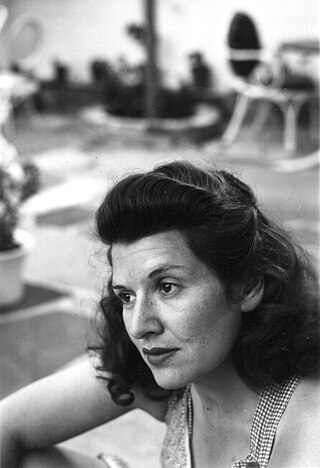
Gladys Aller was an American painter.
Yvonne Pickering Carter is an American painter, performance artist, and educator. She has worked in media including watercolor and collage.
Emily Parker Groom (1876–1975) was an American artist born in Wayland, Massachusetts. She remained an active painter until the age of 97, spending nearly her entire career in Wisconsin, and died in Milwaukee, Wisconsin.
Elizabeth Hamilton Huntington, was a 20th-century American painter best known for her still life and floral paintings, often executed in pastel on paper.

Margaret Casey Gates (1903–1989) was an American artist, painter, art teacher and administrator. She participated in the New Deal's Section of Painting and Sculpture under the Treasury Department, creating the post office mural for Mebane, North Carolina, and a watercolor which was held at Fort Stanton in New Mexico. In addition, she has paintings held in several noted collections in the United States.

Adela Dora Ohlfsen-Bagge, known professionally as Dora Ohlfsen, was an Australian sculptor and art medallist. Working mostly in Italy, her first prominent work was a bronze medallion, The Awakening of Australian Art (1907), which won an award at the 1908 Franco-British Exhibition in London and was purchased for the Petit Palais in Paris. Other notable works include the Anzac Medal (1916), created to raise funds for Australians and New Zealanders who fought in the Gallipoli campaign, and Sacrifice (1926), the war memorial in Formia, Italy.
Tanya Davis is an American artist predominantly known for her hyper-realistic representational watercolors which are often on the subject of reflections and transparency. She is a past President of the Torpedo Factory Artists' Association, one of the largest artists associations in the US. In 1999 she was selected as the Torpedo Factory Artist of the Year.
Dora Cecil Chapman, also known as Dora Cant, was a pre and post-war artist and art teacher who painted landscapes, still-life and portraits in oils, watercolours, gouache and acrylics. She created etchings and prints and was also an accomplished silks-screen printer and potter. A resident of South Australia, New South Wales and England, she was concerned with changing society through social realist art.
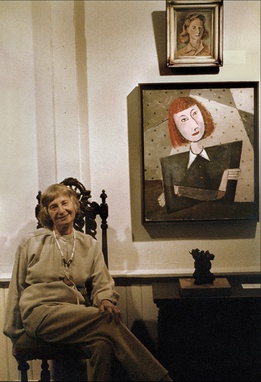
Amalie Rothschild (1916–2001) was an American artist who lived and worked within the art community of Baltimore, Maryland. An accomplished painter and sculptor, she was also an art teacher, philanthropist, patron, and cultural advocate. Over the course of a long career, she made oil and acrylic paintings as well as drawings, watercolors, and other paper works. She also sculpted using found objects, Plexiglas, metals, and particleboard. Originally working in a realist style, she became well known for geometric abstractions based on figurative subjects. In 1993 a critic described this approach as "[walking] a tightrope between the abstract and the representational with a suggestion of three-dimensional depth." Rothschild was by choice a regional artist. Although she occasionally exhibited elsewhere, she did not actively promote her career outside a mid-Atlantic region centered on Baltimore. Thus, in 1997 a critic wrote, "Amalie Rothschild is a fixture and ornament of the Baltimore art world." At the time of her death a critic gave this career summary: "She was one of the leading artists of her time in this area. Her work is thoroughly modern and related to geometric abstraction, but without losing the figure. It has emotional reserve, often contains a hint of humor and at times recalls the childlike sagacity of the great Paul Klee."
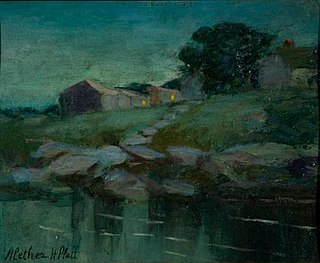
Alethea Hill Platt was an American artist and educator. Her paintings of rural landscapes in France, England, the Adirondacks, and New England were displayed in about 200 exhibitions at venues including the National Academy of Design, Pennsylvania Academy of the Fine Arts, and Louisiana Purchase Exposition. The New York Times found a "quality of serenity, even a kind of nobility" in her work, and American Art News placed her "in the ranks of America's leading women painters."